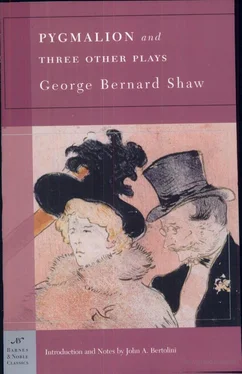HIGGINS What the dickens has happened to you?
DOOLITTLE I shouldnt mind if it had only happened to me: anything might happen to anybody and nobody to blame but Providence, as you might say. But this is something that you done to me: yes, you, Henry Higgins.
HIGGINS Have you found Eliza? Thats the point.
DOOLITTLE Have you lost her?
HIGGINS Yes.
DOOLITTLE You have all the luck, you have. I aint found her; but she’ll find me quick enough now after what you done to me.
MRS. HIGGINS But what has my son done to you, Mr. Doolittle?
DOOLITTLE Done to me! Ruined me. Destroyed my happiness. Tied me up and delivered me into the hands of middle class morality.
HIGGINS [ rising intolerantly and standing over DOOLITTLE ] Youre raving. Youre drunk. Youre mad. I gave you five pounds. After that I had two conversations with you, at half-a-crown an hour. Ive never seen you since.
DOOLITTLE Oh! Drunk! am I? Mad! am I? Tell me this. Did you or did you not write a letter to an old blighter [225] Fellow; rascal.
in America that was giving five millions to found Moral Reform Societies all over the world, and that wanted you to invent a universal language for him?
HIGGINS What! Ezra D. Wannafeller! [226] Parody of “Rockefeller”; John D. Rockefeller (1839-1937) was an American industrialist and philanthropist.
Hes dead. [He sits down again carelessly ] .
DOOLITTLE Yes: hes dead; and I’m done for. Now did you or did you not write a letter to him to say that the most original moralist at present in England, to the best of your knowledge, was Alfred Doolittle, a common dustman.
HIGGINS Oh, after your last visit I remember making some silly joke of the kind.
DOOLITTLE Ah! you may well call it a silly joke. It put the lid on me right enough. Just give him the chance he wanted to shew that Americans is not like us: that they recognize and respect merit in every class of life, however humble. Them words is in his blooming will, in which, Henry Higgins, thanks to your silly joking, he leaves me a share in his Predigested Cheese Trust worth three thousand a year on condition that I lecture for his Wannafeller Moral Reform World League as often as they ask me up to six times a year.
HIGGINS The devil he does! Whew! [Brightening suddenly ] What a lark!
PICKERING A safe thing for you, Doolittle. They wont ask you twice.
DOOLITTLE It aint the lecturing I mind. I’ll lecture them blue in the face, I will, and not turn a hair. It’s making a gentleman of me that I object to. Who asked him to make a gentleman of me? I was happy. I was free. I touched pretty nigh everybody for money when I wanted it, same as I touched you, Henry Higgins. Now I am worrited; tied neck and heels; and everybody touches me for money. It’s a fine thing for you, says my solicitor. Is it? says I. You mean it’s a good thing for you, I says. When I was a poor man and had a solicitor once when they found a pram in the dust cart, he got me off, and got shut of me and got me shut of him as quick as he could. Same with the doctors: used to shove me out of the hospital before I could hardly stand on my legs, and nothing to pay. Now they finds out that I’m not a healthy man and cant live unless they looks after me twice a day. In the house I’m not let do a hand’s turn for myself: somebody else must do it and touch me [227] That is, get money out of me.
for it. A year ago I hadnt a relative in the world except two or three that wouldnt speak to me. Now Ive fifty, and not a decent week’s wages among the lot of them. I have to live for others and not for myself: thats middle class morality. You talk of losing Eliza. Dont you be anxious: I bet shes on my doorstep by this: she that could support herself easy by selling flowers if I wasnt respectable. And the next one to touch me will be you, Henry Higgins. I’ll have to learn to speak middle class language from you, instead of speaking proper English. Thats where youll come in; and I daresay thats what you done it for.
MRS. HIGGINS But, my dear Mr. Doolittle, you need not suffer all this if you are really in earnest. Nobody can force you to accept this bequest. You can repudiate it. Isnt that so, Colonel Pickering?
PICKERING I believe so.
DOOLITTLE [ softening his manner in deference to her sex ] Thats the tragedy of it, maam. It’s easy to say chuck it; but I havent the nerve. Which of us has? We’re all intimidated. Intimidated, maam: thats what we are. What is there for me if I chuck it but the workhouse in my old age? I have to dye my hair already to keep my job as a dustman. If I was one of the deserving poor, and had put by a bit, I could chuck it; but then why should I, acause the deserving poor might as well be millionaires for all the happiness they ever has. They dont know what happiness is. But I, as one of the undeserving poor, have nothing between me and the pauper’s uniform but this here blasted three thousand a year that shoves me into the middle class. (Excuse the expression, maam: youd use it yourself if you had my provocation). Theyve got you every way you turn: it’s a choice between the Skilly of the workhouse and the Char Bydis of the middle class; {58} 58 14 (pp. 441-442) “it’s a choice between the Skilly of the workhouse and the Char Bydis of the middle class”: In Greek legend Scylla, a sea monster, and Charybdis, a whirlpool, occupied opposite sides of the Strait of Messina, through which Odysseus had to sail without being capsized by either. The phrase “between Scylla and Charybdis” means between two equal difficulties.
and I havnt the nerve for the workhouse. Intimidated: thats what I am. Broke. Bought up. Happier men than me will call for my dust, and touch me for their tip; and I’ll look on helpless, and envy them. And thats what your son has brought me to. [He is overcome by emotion ].
MRS. HIGGINS Well, I’m very glad youre not going to do anything foolish, Mr. Doolittle. For this solves the problem of Eliza’s future. You can provide for her now.
DOOLITTLE [with melancholy resignation] Yes, maam: I’m expected to provide for everyone now, out of three thousand a year.
HIGGINS [jumping up] Nonsense! he cant provide for her. He shant provide for her. She doesnt belong to him. I paid him five pounds for her. Doolittle: either youre an honest man or a rogue.
DOOLITTLE [ tolerantly ] A little of both, Henry, like the rest of us: a little of both.
HIGGINS Well, you took that money for the girl; and you have no right to take her as well.
MRS. HIGGINS Henry: dont be absurd. If you really want to know where Eliza is, she is upstairs.
HIGGINS [ amazed ] Upstairs ! ! ! Then I shall jolly soon fetch her downstairs. [He makes resolutely for the door].
MRS. HIGGINS [rising and following him] Be quiet, Henry. Sit down.
HIGGINS I —
MRS. HIGGINS Sit down, dear; and listen to me.
HIGGINS Oh very well, very well, very well. [He throws himself ungraciously on the ottoman, with hisface towards the windows ] . But I think you might have told me this half an hour ago.
MRS. HIGGINS Eliza came to me this morning. She passed the night partly walking about in a rage, partly trying to throw herself into the river and being afraid to, and partly in the Carlton Hotel. She told me of the brutal way you two treated her.
HIGGINS [ bounding up again ] What!
PICKERING [ rising also ] My dear Mrs. Higgins, shes been telling you stories. We didnt treat her brutally. We hardly said a word to her; and we parted on particularly good terms. [ Turning on HIGGINS ] Higgins did you bully her after I went to bed?
HIGGINS Just the other way about. She threw my slippers in my face. She behaved in the most outrageous way. I never gave her the slightest provocation. The slippers came bang into my face the moment I entered the room — before I had uttered a word. And used perfectly awful language.
Читать дальше












